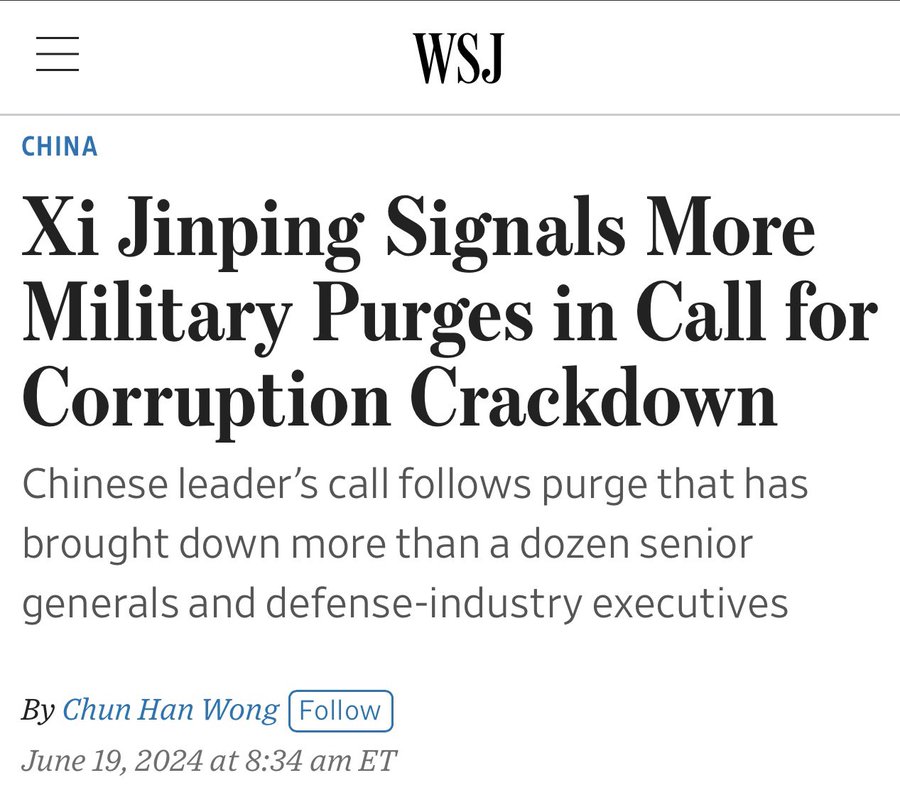There has been a significant purge of Chinese military generals in recent months. This purge has been part of a larger anti-corruption campaign within the People’s Liberation Army (PLA), targeting corruption in military procurement and equipment development as Xi Jinping continues to fight the massive amount of fraud and corruption amongst his senior military staff. Recently, Xi was embarrassed to find that missiles were filled with water rather than fuel, with officials pocketing the money meant to make the missiles fly.
Key points about this latest purge include:
- Nine PLA generals have been removed from the national legislative body, including high-ranking officials from the PLA Rocket Force, which oversees China’s nuclear and ballistic missile arsenal.
- The purge has also targeted at least four aerospace defense industry executives, suggesting corruption investigations into military procurement and equipment development.
- The scale and depth of the purge recall earlier anti-corruption probes in the early years of Xi Jinping’s tenure, which led to the downfall of multiple senior generals and their underlings.
- The purge has raised concerns about the state of China’s military modernization efforts, as well as the potential for instability within the PLA due to the removal of so many high-ranking officers.
- The purge is seen as a setback for Xi Jinping’s efforts to build a “world-class” military by 2050, as it has exposed deep-rooted corruption within the PLA and raised questions about the oversight of military investments.
This has been described as one of the biggest purges in Chinese military history and has led to the removal of several senior generals and their underlings.
“Chinese leader Xi Jinping ordered a redoubled campaign to eradicate graft and enforce loyalty in the military, suggesting no end to a broad purge in the country’s defense establishment…
— Prodigal (@ProdigalThe3rd) June 19, 2024
Over the past year, authorities have removed more than a dozen senior generals in the PLA,… https://t.co/ckebB9kaiJ pic.twitter.com/OXIddzy6uy
The purge has particularly affected the PLA Rocket Force, which oversees China’s nuclear and ballistic missile arsenal. The removal of these senior officers has raised questions about the oversight of military investments and has undermined the PLA’s ability to maintain a credible deterrent against Taiwan and other potential adversaries.
Experts have suggested that the purge has left the PLA weakened, particularly in the strategic nuclear force, which is considered the “bottom line” of China’s national security and the “last resort” on Taiwan.
The loss of experienced military leadership and the disruption of military modernization efforts could increase the risk of miscalculation on the part of the PLA and could undermine China’s ability to execute a successful invasion of Taiwan, should Xi decide to pursue such a course of action.
The purge has also had political implications for Xi, as it has exposed deep-rooted corruption within the PLA and has raised questions about the state of China’s military modernization efforts. This could undermine his credibility and political standing, both domestically and internationally.
In response to the purge, Xi Jinping has ordered a redoubled campaign to eradicate graft and enforce loyalty in the military, suggesting no end to a broad purge in the country’s defense establishment. This has led to a restructuring of the PLA, with the creation of new strategic arms, such as the Information Support Force, which is expected to play a key role in future conflicts.
The impact of the purge on any plans Xi Jinping’s may have for invading Taiwan remains uncertain. Could the purge have weakened the PLA and made an invasion of Taiwan less likely in the near term? Or could be a precursor to a more aggressive military posture by Xi in an attempt to reassert his authority?
